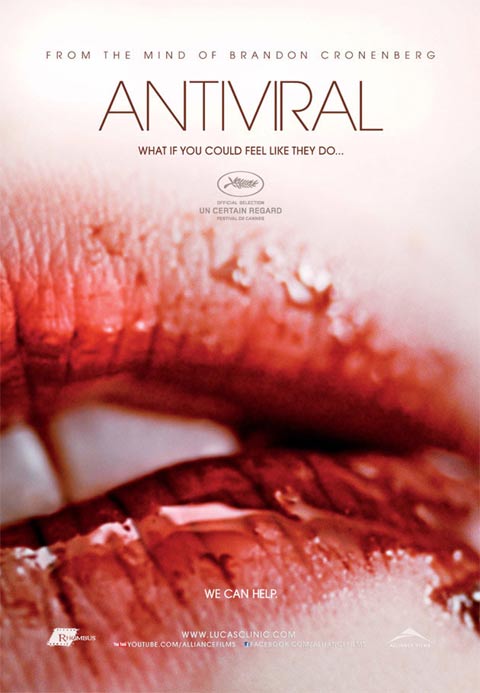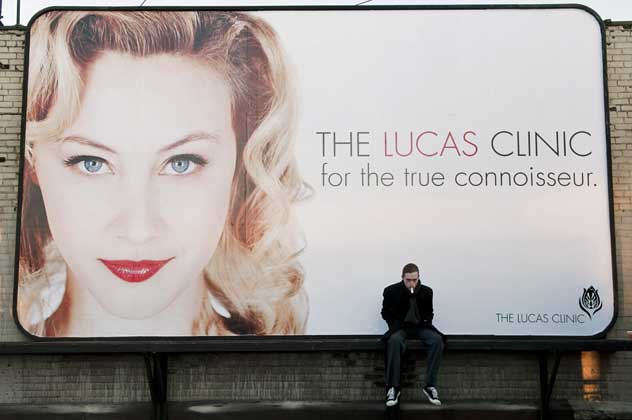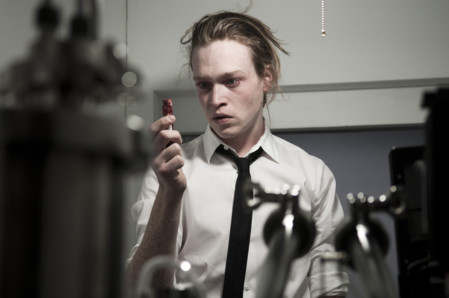LFF: A Conversation on "Antiviral" and Cronenberg Jr.
 Sunday, October 14, 2012 at 10:00AM
Sunday, October 14, 2012 at 10:00AM  Craig here with another LFF report. David & I have a chat about Brandon Cronenberg's striking debut feature Antiviral, showing today at the festival.
Craig here with another LFF report. David & I have a chat about Brandon Cronenberg's striking debut feature Antiviral, showing today at the festival.
Craig: It’s all about celebrity skin in Antiviral as characters indulge in, ahem, the pleasures of the flesh in one form or another. This being the first feature from David Cronenberg’s son Brandon, I perhaps expected a plentiful supply of gratuitous bodily harm. Having no idea prior to seeing the film just what it was about – all I knew was that it was partially set in a mysterious clinic for the stars – the film came as a minor revelation: not only because, for a debut feature, the filmmaking was of an uncommonly high calibre, but also because the most interesting Cronenberg film this year wasn’t brought to us by the oldest member of the Cronenberg clan.
David: I always seem to begin these conversations with a caveat: this time, it's that I missed Cosmopolis, though the wild variety of reactions has me eager to get my teeth into it. But in a general sense, I agree on your point: Antiviral certainly has echoes of the David Cronenberg of the 1980s, mixing an obsession with the body and its orifices – even if many of these are false ones created with a needle – with a cool depiction of technology's terrifying possibilities.
Craig: Yes, even if he doesn’t entirely map out his own territory, Cronenberg Jr asserts himself as a director of impeccable style. On the one hand, David’s influence is certainly pronounced, as well it might be, but on the other hand, dare I say it (and I hate to say it), Brandon has made the kind of film I was hoping for from Cronenberg Sr. senior this year.
David: This might just be me and my limited experience of Cronenberg Sr., but Antiviral seems quite crisp and clinical where I recall his father's films as visually darker and emotionally grubbier. Brandon's use of space, particularly, reminded me less of his father's filmography and more of Julia Leigh's Sleeping Beauty and Todd Haynes' Safe [continue...]
...the almost theatrical framing of spaces, trapping the central character in cold, disconnected surroundings.
Craig: I'd say you were pretty much on the money. David Cronenberg's work is certainly visually denser in tone, more compacted with ugly, fleshy knots. There is a kind of blankness, a minimalism, but it tends to be found in the often laconic performances and measured, monotone dialogue of his work. But I think both father and son, perhaps inevitably, share similar sensibilities in regard to surgical/medical obsession and focus on sci-fi depictions of Canadian institutions (plus the ever-so-slightly outlandish use of names!).
David: My A-ha! moment with comparisons to Safe doesn't end with the look of it – the very striking lead actor Caleb Landry Jones (as Syd March) could almost be Julianne Moore's son, with his endless spread of freckles, pale complexion and searing light red hair. Of course, his character is nowhere near as passive as Moore's Carol White – trap him in a white box-room and he will concoct a vicious way out – but there's a similar fear of disease here, of the unknown propensities of a newly discovered, even revolutionary infection that makes Syd a hot property, a figure of immense interest yet someone people aren't sure they want to touch. That's what all the clients of the clinic are looking for, but perhaps only Syd gets it; that fifteen minutes. I didn't quite buy the extreme measures that people use to try and get closer to their celebrity obsessions, but I think it's a thin conceit you just have to buy into to enjoy the film's world and the clinical horrors that come to life.
Craig: I certainly saw hints of Safe, too, especially the feverish push-pull of disease ownership and the ingrained verbiage around it. There’s also a whiff of THX-1138 in there too – in the clinical starkness and feeling that beyond the limits of the immediate environment something either more ominous or, perhaps, hopeful is lurking.

David: One of the things I really did appreciate about the film was just that something. Syd moves between these enclosed spaces, and does even visit ordinary places like a diner and that odd celebrity butcher shop, but by hewing itself so closely to his side, the wider society around him remains only barely glimpsed. Antiviral never oversells the idea of the dominance of technology in the deepened obsession with stars, and keeps enough of a semblance to our current moment that the horrors, despite the difficulty of the conceit, don't feel totally alien. It's a tricky balancing act, but it's one I think Cronenberg pulls off.
Craig: The comment on contemporary celebrity fixation was quite pointed, and rather funny in places, too. The gossipy co-worker, who Syd queues in line with, is purely there for light relief, but it works well to both oddly complement and counterbalance the grimmer intentions woven throughout. The wider view seems located in and inferred by the dialogue. Regarding performances: Caleb Landry Jones, in the lead, has a very wan, off-kilter look which only heightens the sense of the sickly uneasiness that Antiviral achieves. His demeanour constantly suggested he was on the verge of breaking into some uncontrollable guttural scream. This tension accrued as the film played out – and of course there’s a certain late scene which capitalises on this very thing. But he seemed to be trying a touch too hard to embody all the obvious transgressive aspects of the film with an over-reliance on repetitive actions in certain scenes -- It struck me as similar to the way that an improvising actor might overuse adlib in times of “dead” screen time. Or put it this way: there was a lot of awkward coughing whilst he endlessly stumbled around. But regardless, he looked the part, as you say. Plus, the striking visuals and crisp framing, especially in the elusive introductory scenes, were often stunning.
David: I actually thought Landry Jones was very strong. It might be my tendency to appreciate very physical acting – the extent to which his body contorted and closed in on itself was so vivid it recalled Keira Knightley's performance in A Dangerous Method. They're performances that just fascinate and intrigue me, because they don't abandon the psychological, they confront you with it, lay it all on the line. In the very shallow society Antiviral presents, such a physical performance seems very fitting. I thought his modulation of voice was highly effective too – a hushed, restricted tone, used more to keep himself hidden and inconspicuous than to show fear or repression.
Craig: I guess I just didn’t see much of a psychology within the performance. To me it followed a single standard route without any of the fluctuations that deepen a piece of acting. However, although she was a peripheral physical presence, I thought Sarah Gadon did wonders as diseased starlet Hannah Geist: she embodied the part of the unattainable icon and in her bizarre, half- glimpsed free-from-the-spotlight moments she took on the allure of a sickly vapour that's seeping into the film itself. She was the epicenter after all.
David: Keeping with my preference for physical, visual performance, my main criticism of the film would be that there wasn't enough visceral action – blood starts bursting out in the final stretch, but the third quarter sagged quite heavily for me as it became lost in a quagmire of exposition and revelation. I'd wager that's where it lost the crispness and invention of the visuals you so rightly credit it with, before thankfully being injected with a bit of panache for the climax.
Craig: It does coast for too long– a lull before the storm– and this is where, say, 10 minutes could’ve easily been cut to maintain the momentum in reaching its last grisly stretch. Perhaps Cronenberg Jr. was aware of the clear influence of Cronenberg Sr. and wanted to dial down the grandiose gore in favour of minor, slicker moments of bodily subversion? Also, one thing I found was that its overall feel, underneath the pristine veneer, was very much structured like Film Noir: the anti-hero staggering from place to place fixing meetings with criminals, getting his home overturned by shady figures, visiting the rich ‘femme fatale’, and suffering through his own internal conflicts. In short, he gets in too deep!

Cronenberg handles this off-the-wall genre squish-up successfully: he integrates thrilling genre elements into an unusual slant on both the disease movie (it’s as much D.O.A. as Safe, I’d say) and the paranoiac thriller and comes up with a twisted and unnerving clinical horror movie to very nearly match one of his dad’s early films. I’m hoping that his next film will allow him to expand on the promise here and see him put a solidly individual stamp on it.
David: B- / Craig: B
 Antiviral,
Antiviral,  Brandon Cronenberg,
Brandon Cronenberg,  David Cronenberg,
David Cronenberg,  LFF,
LFF,  film festivals
film festivals 



Reader Comments (2)
So happy the Cronenbergs made Sarah Gadon happen and accelerated her career. She has such a great presence on screen.
Bia - absolutely agree. I wasn't sure until Cosmopolis but damn she was smartly stilted/removed in that movie. loved her.
david & craig -- thanks for covering this. I'm so curious to see this now when before all i thought was ... really? like kind of how i feel about Anne Rice's son writing horror novels.